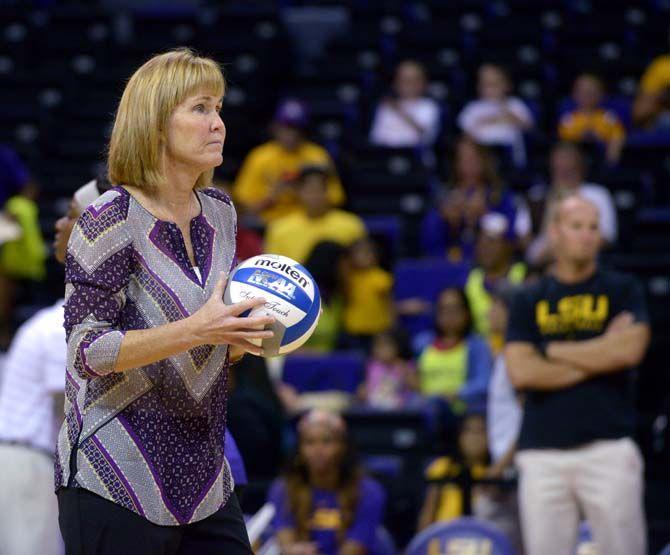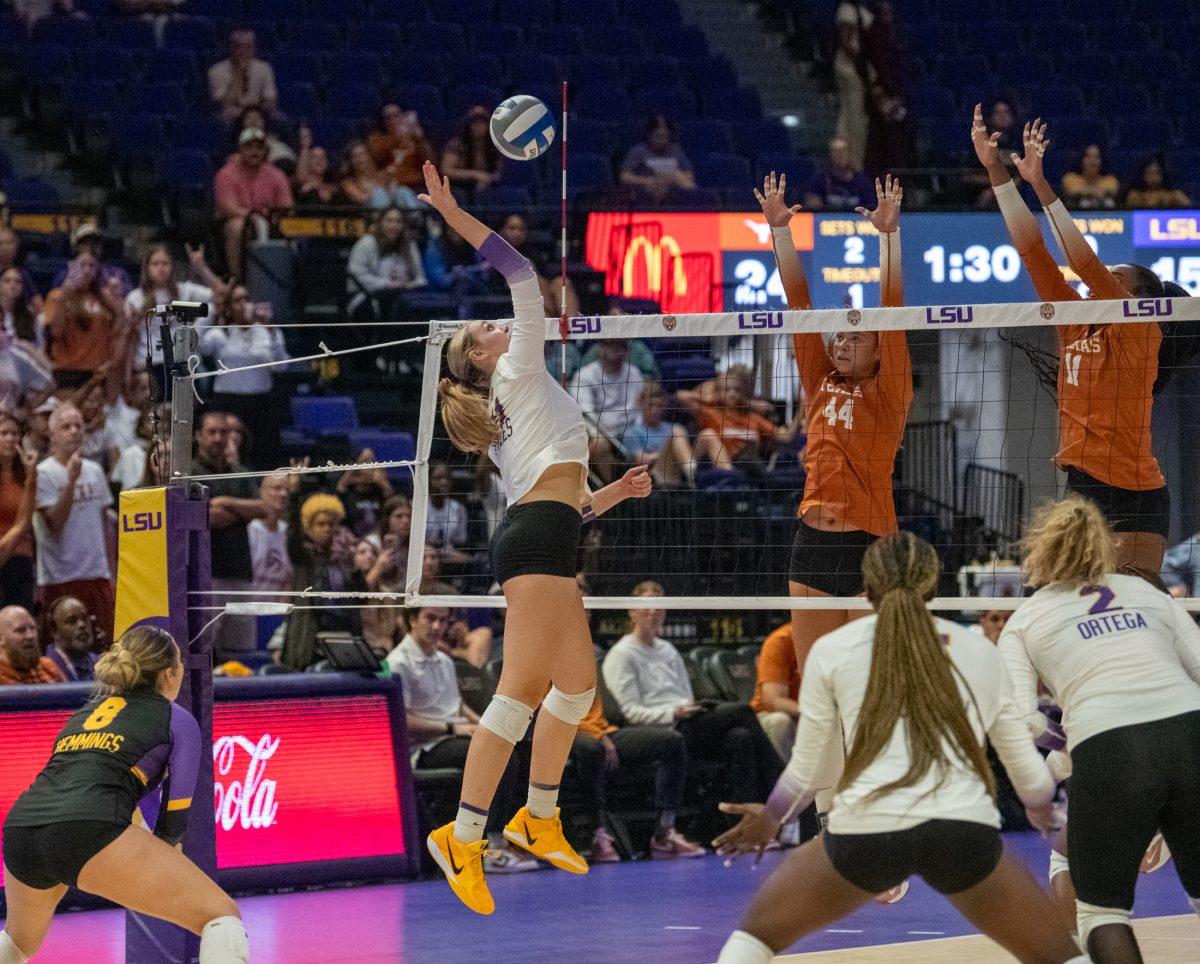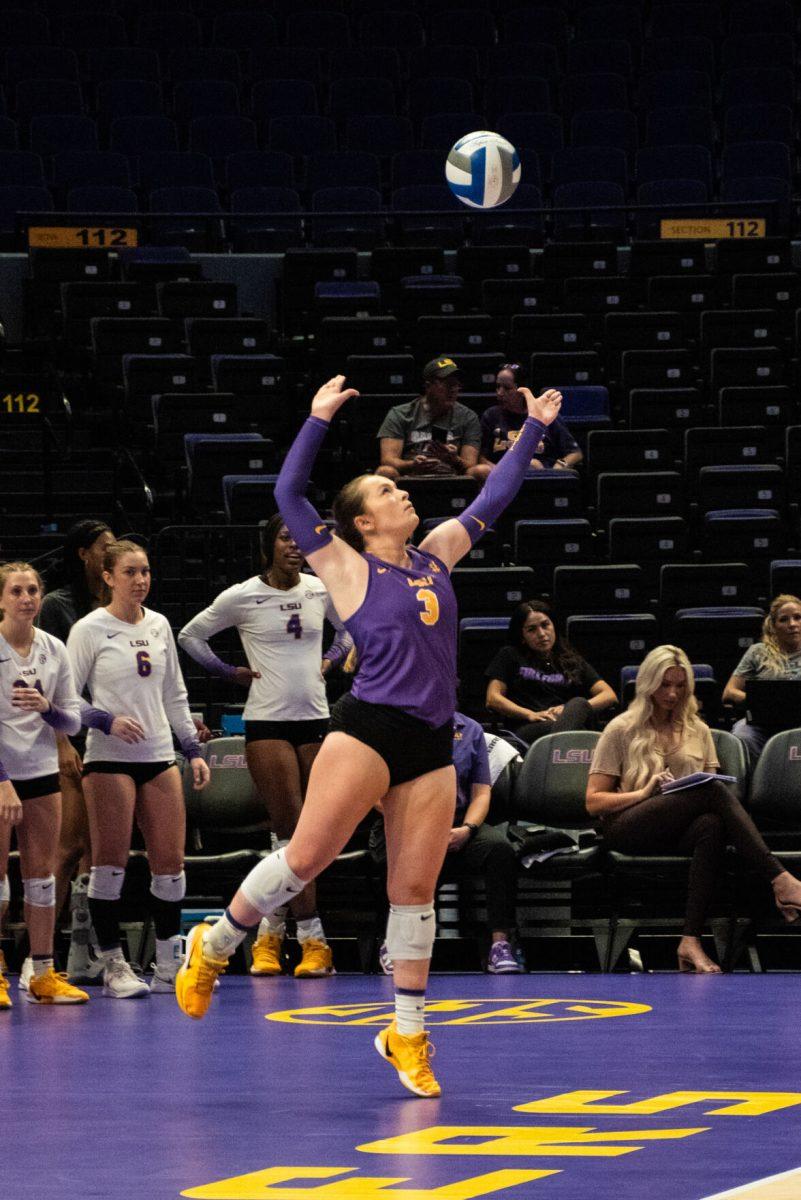LSU volleyball coach Fran Flory sits in her office surrounded by permanent reminders of her accomplishments.
There are trophies for conference and division championships, trips to the national semifinals and a litany of other achievements. On top of the cabinets above her desk sits her most recent edition: a volleyball marked “309” commemorating her record number of wins at LSU.
But Flory doesn’t show any of these off. Instead, she reaches to a box under her desk and grabs a yellow toy bus she received that morning.
“It’s the energy bus,” Flory says while pointing to a piece of paper acting as a label taped on top of the toy bus. “The doors open just like a real bus. I know I’m like a kid right now, but this is awesome. Watch this.”
Flory pulls the toy bus backward and lets it go, allowing it to speed forward across her desk from its own power until she grabs it.
“How cool is that?” Flory asks.
The bus is a reference to Jon Gordon’s best-selling book “The Energy Bus: 10 Rules to Fuel Your Life, Work, and Team,” which is a source of inspiration for Flory and the Tigers this season.
But as the bus rolls from one end of her desk to the other, the journey Flory took to earn the accolades surrounding her comes to mind.
It all started in Baton Rouge, where Flory developed the will to compete at an early age. She began swimming competitively at 6 years old and shortly thereafter began participating in every sport possible.
As a self-proclaimed tomboy, even the sports made available to Flory growing up didn’t seem like enough. She wanted to play everything, and she wanted to beat everybody else playing.
“I really and truly wanted to be a football player,” Flory said. “I wanted to be a boy who got to play football and I wanted to be Bert Jones and Fran Tarkenton. They were my heroes growing up for sure. Those are my people.”
This competitive edge led to her introduction to volleyball.
Going into her sophomore year at Episcopal High School, Flory wanted nothing more than to win a state championship in basketball. But before that could happen, she had to make sure she gave her team the best chance of winning, months before the start of the season.
“The best athlete in the school played volleyball,” Flory said. “So I cut a deal with her. I promised her I’d play volleyball if she would play basketball because I thought she could help us win in basketball.”
That deal started a journey that still hasn’t ended almost 40 years later, although it wasn’t completely obvious the first time Flory took the floor for a volleyball game.
“I had no idea what I was doing,” Flory said. “I didn’t even know how to rotate. They literally grabbed me by my jersey and said ‘stand here, and don’t let the ball cross the net here. Stand here and if we set you hit the ball and put it on the floor.’”
Flory’s athleticism out-weighed her inexperience, and three years later, Flory found herself at the University of Texas, which recruited her to play both basketball and volleyball.
By mid-October of her freshman season, Flory earned a starting position on the Texas volleyball team’s lineup. But when then-Texas women’s basketball coach Jody Conradt asked Flory if she would be attending basketball practice, then-Texas volleyball coach Mick Haley gave her an ultimatum: either she played basketball, or she stayed in the volleyball lineup.
“Then it became a really easy answer,” Flory said. “I had worked too hard, and I was going to be a better volleyball player at that point than a basketball player, and I was smart enough to know that. I had people telling me that was where I needed to be.”
The decision paid off in Flory’s sophomore season at Texas in 1981, when the Longhorns went 60-6-1 on their way to a national championship.
At the time, winning that championship was everything to Flory and her teammates, many of whom she is friends with to this day. But as time passed, Flory found being on top didn’t compare to the path she and her teammates took to get there.
“The most important part when you reflect on it, is the journey,” Flory said. “To work that hard, and to get something at the end that everybody else wanted that you were not going to let anybody else have, that was truly the best part of it for me.”
Flory’s life seemed to be falling into place as she landed a graduate assistant coaching position at Texas A&M where her first husband was studying meteorology.
But Flory’s journey took a sharp turn when her husband entered an operating room for an ordinary procedure and exited with little time to live.
“He thought he was going in for an appendectomy,” Flory said. “He came out and had full-blown colon cancer and didn’t live more than three months.”
After her husband’s death, Texas A&M offered Flory a job, but an opportunity to return home for a restricted earnings position on LSU’s staff presented itself, and Flory said it just felt right.
It wasn’t much — Flory said her first paycheck from LSU was written for $393 — but it was a job. She was back home close to her family and friends.
“I just knew that was what was supposed to happen,” Flory said. “When I came here, I just had the right feeling. My parents were still here. It was just the right situation. For some reason you get led into those types of decisions, and it couldn’t have been a better time.”
Not only was it the right fit for Flory’s personal life, but also for LSU volleyball.
In the four years Flory spent under former LSU volleyball coach Scott Luster, LSU won three Southeastern Conference championships and reached back-to-back NCAA Final Fours in 1990 and 1991.
Flory said she learned an immense amount of coaching knowledge from Luster, who held the title of winningest coach in LSU history until Flory surpassed him Oct. 22.
“Scott Luster is one of the most amazing volleyball coaches ever,” Flory said. “He understands the game at a completely different level. He could get kids to play positions that they hadn’t even practiced and thrive in a match.”
Things seemed to be clicking for Flory, but her journey once again seemed to veer off course when then-LSU athletic director Joe Dean informed her that she would be laid off along with all other coaches in restricted earnings positions.
Flory begrudgingly accepted Dean’s help in landing a head coaching gig at Southeastern Louisiana, where she spent a year before taking a job at Kentucky. She was to assist head coach Kathy DeBoer for a couple seasons before taking the reins as head coach when DeBoer moved into an administrative position.
Shortly after accepting the job, DeBoer called Flory with some unexpected news.
“Within three months she called me and said ‘I’m going to be an administrator and you have to be the head coach,’” Flory said.
Flory, no stranger to unexpected outcomes at this point, entered the position somewhat reluctantly but quickly fell in love with the program.
Even as she found her place as a Wildcat, she always felt a longing to return to LSU. She told recruits it was the only job she’d leave Kentucky for.
She kept true to that promise in 1998 after five seasons at Kentucky when Luster departed as LSU’s head coach.
Everything in Flory’s life up to that point led to her homecoming in Baton Rouge. It was her final stop.
And while she got off one bus and right on another, she’s been on this one at LSU for 17 years. She still wakes up just as giddy as she did on her first day on the job.
“I know that I’m doing exactly what I’m supposed to do in the world,” Flory said. “I have no desire to do anything differently … There’s nothing else in the world that I want to do. I don’t know how many more wins, but there are a lot more years left in me.”
She has left a permanent mark on LSU volleyball as one of the best and most influential coaches the program has ever had.
But it has never been about the titles she has earned, her legacy or even the number of wins she garners.
She didn’t even know she was on the verge of breaking Luster’s record until a reporter asked about it while informing her she had just earned her 300th win against Samford.
“I honestly don’t pay attention,” Flory said. “It’s nice, and I’m grateful and appreciative, but really? Sometime way down the road, somebody will say, whatever. But today, my job is to get this team to be great. That is my absolute singular focus … When it’s all said and done, I want to be able to say I left this place better than when I found it. If I did that, I did my job. I did what I came here to do.”
You can reach Tyler Nunez on Twitter @Nunez_TDR.
LSU volleyball coach Fran Flory breaks wins record after winding career
By Tyler Nunez
November 3, 2014
Fran Flory prepares her players before the game during the Tigers’ 3-1 loss aginst Kentucky Wednesday, September 24, 2014 in the PMAC. Since then she has becomed LSU volleyball winningest head coach.
More to Discover








